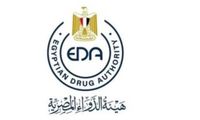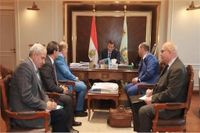On Monday, March 24, 2025, Egypt's Minister of Agriculture, Alaa Farouk, convened a meeting with Dr. Magdy El-Sayed, chairman of a veterinary vaccine company, focused on advancing the localization of veterinary vaccine technology in Egypt. This initiative seeks to enhance the country’s capacity not just to produce its own vaccines but also to export them efficiently.
During the meeting, which included key figures such as Dr. Saad Moussa, the agricultural foreign relations supervisor, Dr. Mohamed Saad, director of the Veterinary Serum and Vaccine Research Institute, and Dr. Ahmed El-Qadi, the company's executive director, Farouk emphasized the government's commitment to President Abdel Fattah El-Sisi's directive to localize manufacturing technologies traditionally imported from abroad.
He pointed out that this localization effort is crucial in adding value to Egypt's national output, earning foreign currency, reducing import costs, and creating job opportunities for the local workforce.
Farouk stated, “We aim to compile a comprehensive list of all veterinary vaccines currently utilized in Egypt. This encompasses an in-depth study of the vaccines that can be localized and subsequently expanded for domestic production.”
The Minister praised the private sector's growing role in vaccine production and supported initiatives to remove obstacles faced by companies engaged in this vital industry. He highlighted the significant contributions of MIVAC Company (the veterinary vaccine producer) in the localization and manufacture of technologies crucial for the livestock and poultry industries, safeguarding them from illnesses and epidemics.
Dr. Magdy El-Sayed presented the operational achievements of MIVAC, which began its journey in 2008 and was officially opened in 2011. The company currently boasts investments exceeding 5 billion Egyptian pounds, with international contributions from the Arab Investment and Agricultural Development Authority and partners from the United States.
El-Sayed elaborated that MIVAC has successfully developed and manufactured over 77 different vaccines, aimed at protecting animals from significant epidemic threats, operating on more than four production lines with a capacity exceeding 4 billion doses by 2024. The company plans to introduce additional production lines that will boost its output to 12 billion doses by 2025-2026, meeting both local and export demands.
With aspirations to establish the first veterinary vaccine manufacturing center in the Middle East in Egypt, MIVAC is dedicated to providing thousands of job opportunities moving forward. Furthermore, the company is scheduled to inaugurate a new factory soon in the Al-Salihiya area, collaborating with various local and international stakeholders.
The meeting also included discussions to enhance export opportunities to African countries, reflecting Egypt’s strategy to strengthen cooperation with its African partners in the veterinary vaccine sector. Farouk called for increasing the company's export share to Africa, in line with Egypt’s broader commitment to foster regional collaboration.
As the meeting concluded, the Minister of Agriculture directed the preparation of a cooperation protocol between the Ministry and MIVAC to formalize their collaboration and support further development in the sector.
This initiative not only showcases Egypt's commitment toward self-sufficient veterinary vaccine production but also heralds a future where the country plays a pivotal role in the regional vaccine supply chain, potentially reaching over 60 countries for vaccine exports by the end of the current year.


